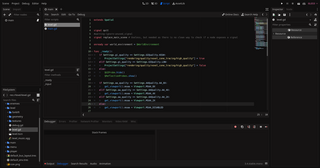A "Hello, World!" program is generally a simple computer program which outputs to the screen a message similar to "Hello, World!" while ignoring any user input. A small piece of code in most general-purpose programming languages, this program is used to illustrate a language's basic syntax. A "Hello, World!" program is often the first written by a student of a new programming language, but such a program can also be used as a sanity check to ensure that the computer software intended to compile or run source code is correctly installed, and that its operator understands how to use it.
In computer programming, the scope of a name binding is the part of a program where the name binding is valid; that is, where the name can be used to refer to the entity. In other parts of the program, the name may refer to a different entity, or to nothing at all. Scope helps prevent name collisions by allowing the same name to refer to different objects – as long as the names have separate scopes. The scope of a name binding is also known as the visibility of an entity, particularly in older or more technical literature—this is in relation to the referenced entity, not the referencing name.

D, also known as dlang, is a multi-paradigm system programming language created by Walter Bright at Digital Mars and released in 2001. Andrei Alexandrescu joined the design and development effort in 2007. Though it originated as a re-engineering of C++, D is now a very different language drawing inspiration from other high-level programming languages, notably Java, Python, Ruby, C#, and Eiffel.
In computer science, reflective programming or reflection is the ability of a process to examine, introspect, and modify its own structure and behavior.
In compiler construction, name mangling is a technique used to solve various problems caused by the need to resolve unique names for programming entities in many modern programming languages.
The GNU Scientific Library is a software library for numerical computations in applied mathematics and science. The GSL is written in C; wrappers are available for other programming languages. The GSL is part of the GNU Project and is distributed under the GNU General Public License.
XS is a Perl foreign function interface through which a program can call a C or C++ subroutine. XS or xsub is an abbreviation of "eXtendable Subroutine".
In programming and software design, binding is an application programming interface (API) that provides glue code specifically made to allow a programming language to use a foreign library or operating system service.
A foreign function interface (FFI) is a mechanism by which a program written in one programming language can call routines or make use of services written or compiled in another one. An FFI is often used in contexts where calls are made into binary dynamic-link library.
The C and C++ programming languages are closely related but have many significant differences. C++ began as a fork of an early, pre-standardized C, and was designed to be mostly source-and-link compatible with C compilers of the time. Due to this, development tools for the two languages are often integrated into a single product, with the programmer able to specify C or C++ as their source language.
Haxe is a high-level cross-platform programming language and compiler that can produce applications and source code for many different computing platforms from one code-base. It is free and open-source software, released under the MIT License. The compiler, written in OCaml, is released under the GNU General Public License (GPL) version 2.
The following tables provide a comparison of numerical analysis software.
libffi is a foreign function interface library. It provides a C programming language interface for calling natively compiled functions given information about the target function at run time instead of compile time. It also implements the opposite functionality: libffi can produce a pointer to a function that can accept and decode any combination of arguments defined at run time.
A wrapper function is a function in a software library or a computer program whose main purpose is to call a second subroutine or a system call with little or no additional computation. Wrapper functions are used to make writing computer programs easier by abstracting away the details of a subroutine's underlying implementation.

A scripting language or script language is a programming language that is used to manipulate, customize, and automate the facilities of an existing system. Scripting languages are usually interpreted at runtime rather than compiled.
Wrapper libraries consist of a thin layer of code which translates a library's existing interface into a compatible interface. This is done for several reasons:
Getopt is a C library function used to parse command-line options of the Unix/POSIX style. It is a part of the POSIX specification, and is universal to Unix-like systems. It is also the name of a Unix program for parsing command line arguments in shell scripts.

Nim is a general-purpose, multi-paradigm, statically typed, compiled high-level systems programming language, designed and developed by a team around Andreas Rumpf. Nim is designed to be "efficient, expressive, and elegant", supporting metaprogramming, functional, message passing, procedural, and object-oriented programming styles by providing several features such as compile time code generation, algebraic data types, a foreign function interface (FFI) with C, C++, Objective-C, and JavaScript, and supporting compiling to those same languages as intermediate representations.


